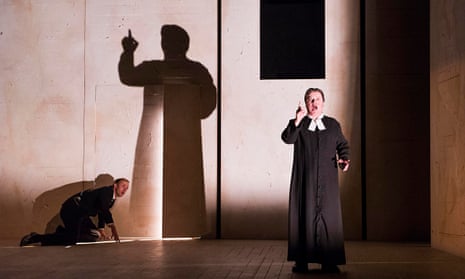The Trial, Philip Glass’s latest opera, is his 26th and the first to receive its world premiere in this country. Based upon Franz Kafka’s unfinished novel, it’s one of the smaller-scale ones, requiring just eight singers, most of whom play multiple roles, and an orchestra of 12 players. It was composed especially for Music Theatre Wales, whose history with Glass goes back to the early days of the company in the late 1980s, when it gave the UK premiere of his Fall of the House of Usher.
Since then it has introduced another of his operas, In the Penal Colony. That was based on Kafka, too, but The Trial seems to me a far more convincing and successful piece of music theatre. The libretto by Christopher Hampton expertly fillets the original text, and its rather flat, matter-of-fact dialogue not only seems to capture the essence of Kafka’s strange, surreal fable about the hapless Josef K, who finds himself arrested and accused of unspecified crimes, but also turns out to be perfectly tailored to Glass’s straightforward syllabic word setting. This is the third opera that Glass and Hampton have written together, after Waiting for the Barbarians in 2005 and Appomattox two years later. It’s a partnership that seems to work well, for in the new opera there’s none of the dramatic uncertainty and lack of focus that characterised Glass’s The Perfect American, which ENO staged last year.
The operatic style that Glass has honed over the last 30 years is all about musical story-telling. Every word of the text here is crystal clear – surtitles have never seemed more superfluous – and the narrative is unfussily unfolded. But though the vocal lines are neutrally functional rather than florid, the score adds up to much more than just a play with musical accompaniment. There’s a real flavour of between-the-wars Austro-Germany about the sound world; the prominence of clarinet, trumpet and trombone in the textures, with brittle percussion and more than a hint of marching and dancing rhythms, seems to evoke the world of Kurt Weill especially, and pieces like Weill’s Happy End and the Mahagonny Songspiel aren’t that far away from The Trial either.
For what is so often portrayed as Kafka’s bleak, dystopian vision of an authoritarian state, in which an unsuspecting man can find himself arrested and convicted for unspecified crimes, is presented here much more as a surreal comedy. It’s a very black comedy certainly, and there aren’t many laugh-out-loud moments, but the absurdist elements of Josef K’s predicament certainly aren’t underplayed. Michael McCarthy’s spare production, in a set by Simon Banham of three plain walls with the bare minimum of tables, chairs and a bed, captures that strange, vaguely paranoiac world well, too; Josef K’s ever deeper immersion in a mire of inconsistencies is constantly observed through windows and doors, while the comedy moustaches of the two men who arrest him and the ZZ Top-like beards of the court officials seem to evoke the spirit of silent movies.
With Michael Rafferty conducting, the performances, led by Johnny Herford as the uncomprehending and finally utterly resigned Josef, are all excellent. Everyone else in the cast takes at least two parts. Rowan Hellier and Amanda Forbes are the femmes fatales who generally add to the confusion of Josef’s predicament; Michael Bennett and Nicholas Folwell are the guards who arrest him, Gwion Thomas the lawyer who feebly attempts to defend him; Paul Curievici the strange painter Titorelli, and Michael Druiett the police inspector. It’s altogether a successful, very watchable piece of music theatre.

Comments (…)
Sign in or create your Guardian account to join the discussion